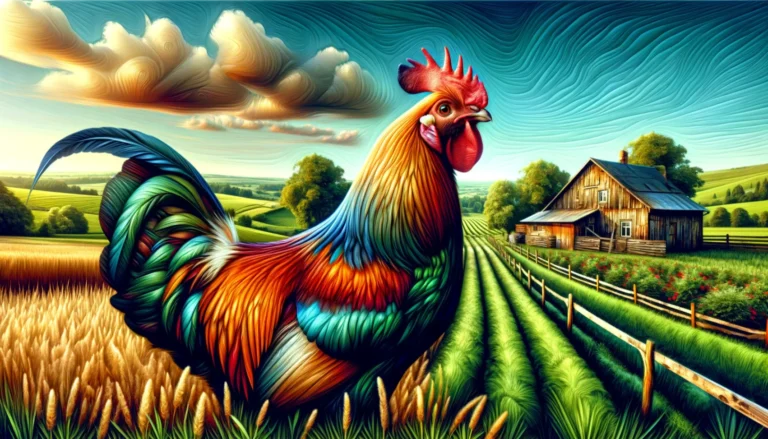Campine Chicken Symbolism and Meaning

Campine Chickens are a breed of domestic chicken known for their striking appearance, with a beautiful black and white feather pattern and friendly personality. They originated in the region now known as Belgium and were bred primarily for their egg-laying abilities, but they also have a rich history of symbolism and cultural significance. This article will explore the various meanings associated with Campine Chickens throughout history and culture.
Symbolism in Ancient Times
In ancient times, chickens were often considered sacred animals and symbols of fertility, abundance, and prosperity. The Campine Chicken’s striking appearance made it a popular choice for religious rituals and ceremonies. They represented good luck and protection due to their unique coloration and strong temperament. In many cultures, the black and white feathers symbolized balance and harmony, reflecting the yin-yang principle, which is an essential concept in Eastern philosophy. Their bold features were also associated with clarity, wisdom, and spiritual growth. The Campine Chicken’s striking appearance was seen as a symbol of duality, often used to represent the interplay between dark and light or good and evil.
Symbolism in Religion
In Christianity, chickens were considered a symbol of rebirth and resurrection because they can reproduce rapidly and lay eggs regularly. This association is echoed in Campine Chickens’ symbolism as well, with their association with new beginnings and life-giving properties. The dual nature of black and white feathers may also represent the contrast between good and evil or light and darkness. In some cultures, they were associated with the divine and the afterlife, particularly in the story of Easter, where eggs symbolized the resurrection of Jesus Christ.
Symbolism in Mythology
Chickens have appeared in various mythologies as symbols of divinity and sacrifice. Greeks revered chickens for their ability to produce life and considered them sacred creatures, often associated with goddesses like Demeter, who was the goddess of agriculture, grain, and fertility. In Norse mythology, they represented sacrifice and rebirth, symbolizing regeneration, as their eggs were linked to the rebirth of new life after death. Similarly, in Egyptian culture, chickens were associated with goddess Isis, the mother of Horus, who was believed to have created humans from her own body.
Cultural Significance
Campine Chickens have been culturally significant in Belgium, where they originated. Belgians associate them with good luck and prosperity due to their egg-laying abilities. The chickens were a source of food but also held symbolic value during special occasions like weddings and harvest festivals. Their striking appearance made them an essential part of local folklore and tradition, reflecting the community’s values and beliefs about life cycles.
Animal Symbolism in Art and Literature
Campine Chickens have been featured in art and literature representing various themes such as fertility, rebirth, and protection. In paintings by artists like Jan van Eyck, they were depicted alongside religious icons or characters, signifying spirituality and divine presence. Their image was a common motif in medieval manuscripts and tapestries, highlighting their sacred status. They were often associated with abundance, prosperity, and wisdom.
Symbolism in Modern Times
Today, Campine Chickens represent sustainable living and organic farming practices. Many farmers adopt this breed for their ability to thrive on small spaces, promoting environmentally friendly farming techniques. Their symbolic value extends from self-sufficiency to the importance of natural resource preservation. The black and white feathers signify balance in life, emphasizing harmony with nature.
Symbolism within the Chicken Community
Within the poultry community, Campine Chickens are symbols of resilience, adaptability, and versatility. Their breed has remained relatively unchanged since the 19th century, highlighting their ability to survive through different environmental changes while maintaining productivity. In agricultural circles, they symbolize continuity and adaptability in an ever-changing world.
Symbolism for Smallholder Farmers
Smallholders view Campine Chickens as an emblem of sustainability. They are seen as a practical choice due to their ability to thrive in small spaces, making them popular among urban dwellers pursuing self-sufficiency. Their hardiness reflects their adaptability and resourcefulness, representing the resilience needed for modern living.
Symbolism in Folklore
Campine Chickens feature in local folklore as guardians of homes and communities, with stories passed down generations to signify protection and nurturing qualities. In some regions, they are considered harbingers of good fortune or predictors of weather changes due to their keen senses. They were believed to have healing properties linked to ancient myths that associated chickens with magical powers.
Symbolism in Poultry Shows and Competitions
Campine Chickens participate in poultry shows, where they represent elegance and beauty. Winning Campine Chickens often signify the owner’s expertise and commitment to breed preservation. In competitions, these birds symbolize dedication and skill in raising rare breeds.
Symbolism in Farming Practices
Campine Chickens are symbols of sustainable farming practices, emphasizing humane treatment of animals. Their cultural significance extends to modern agriculture, showcasing the importance of preserving heritage breeds and promoting ethical farming methods.
Conclusion
Campine Chickens hold deep symbolic value across different cultures and eras. They’re not just pets but also symbols that enrich our lives with their history, adaptability, and cultural significance. Their striking appearance and temperament make them an essential part of folklore, art, literature, and religious rituals. Their resilience and productivity showcase the value of preserving rare breeds and respect for nature’s harmony. The Campine Chicken is a testament to how we perceive life through simplicity and balance in our surroundings. Despite being raised for eggs, they represent much more: harmony between light and darkness, spirituality, adaptability, and self-sufficiency in modern society. They remind us of the power of adapting to change and respecting nature’s wisdom.
In conclusion, Campine Chickens are complex symbols representing balance, adaptability, and survival. From ancient rituals to modern practices, they have evolved as emblems of protection, prosperity, and sustainability. They symbolize resilience in face of challenges, promoting the importance of preserving heritage breeds and respect for nature. The Campine Chicken’s meaning transcends beyond their role as poultry; they’re reminders of spiritual growth, harmony, and adaptability to life’s complexities.





